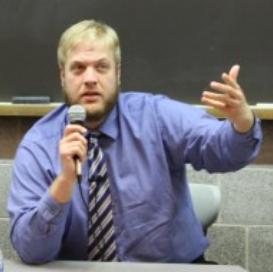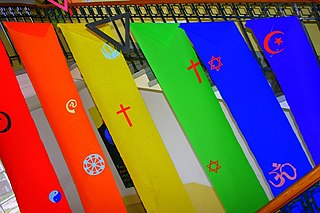Related Research Articles
Within the Muslim world, sentiment towards LGBTQ people varies and has varied between societies and individual Muslims, but is contemporarily negative. While colloquial and in many cases de facto official acceptance of at least some homosexual behavior was commonplace in pre-modern periods, later developments, starting from the 19th century, have created a generally hostile environment for LGBTQ people. Most Muslim-majority countries have opposed moves to advance LGBTQ rights and recognition at the United Nations (UN), including within the UN General Assembly and the UN Human Rights Council.
Lesbian, gay, bisexual, transgender, queer, intersex, and asexual (LGBTQIA+) people frequently experience violence directed toward their sexuality, gender identity, or gender expression. This violence may be enacted by the state, as in laws prescribing punishment for homosexual acts, or by individuals. It may be psychological or physical and motivated by biphobia, gayphobia, homophobia, lesbophobia, aphobia, and transphobia. Influencing factors may be cultural, religious, or political mores and biases.
Opposition to legal rights for lesbian, gay, bisexual, transgender and queer (LGBTQ) people exists throughout the world. LGBTQ rights opponents may be opposed to the decriminalization of homosexuality; laws permitting civil unions or partnerships or supporting LGBT parenting and adoption, LGBT military members, access to assisted reproductive technology, and access to gender-affirming surgery and gender-affirming hormone therapy for transgender individuals.

Amina Wadud is an American Muslim theologian. Wadud serves as visiting professor at 4 Consortium for Religious Studies and was also a visiting scholar at Starr King School for the Ministry. Wadud has written extensively on the role of women in Islam.

Lesbian, gay, bisexual, transgender, and queer (LGBTQ) people in Iraq face severe challenges not experienced by non-LGBT residents. Openly LGBTQ individuals are subject to criminal penalties under the 2024 law making homosexual relations punishable by up to 15 years in prison with fines and deportation; the 2024 law also criminalizes and makes punishable by prison time promoting homosexuality, doctors performing gender-affirming surgery, and men deliberately acting like women. Discrimination is also widespread. Openly gay men are not permitted to serve in the military and same-sex marriage or civil unions are illegal. LGBTQ people do not have any legal protections against discrimination and are frequently victims of vigilante justice and honor killings.
Homosexuality in India is socially permitted by most of the traditional native philosophies of the nation, and legal rights continue to be advanced in mainstream politics and regional politics. Homosexual cohabitation is also legally permitted and comes with some legal protections and rights.

Suhaib Webb is an American Muslim imam who converted from Christianity to Islam in 1992. He has previously been the imam of the Islamic Society of Boston Cultural Center (ISBCC).

Lesbian, gay, bisexual, transgender, and queer (LGBTQ) people in Tunisia face legal challenges not experienced by non-LGBTQ residents. Both male and female kinds of same-sex sexual activity are illegal in the country. According to the United States Department of State's 2018 report on human rights in Tunisia, "authorities occasionally use [the anti-sodomy law] to detain and question persons about their sexual activities and orientation, reportedly at times based on appearance alone."

A Jihad for Love is a 2008 documentary film written and directed by Parvez Sharma and was the world's first film on Islam and homosexuality. It took a total of six years to make and premiered at the Toronto International Film Festival in September 2007. It premiered at the Berlin Film Festival in 2008 as the opening documentary film for the Panorama section.

Lesbian, gay, bisexual, transgender and queer (LGBTQ+)-affirming religious groups are religious groups that welcome LGBT people as their members, do not consider homosexuality as a sin or negative, and affirm LGBT rights and relationships. They include entire religious denominations, as well as individual congregations and places of worship. Some groups are mainly composed of non-LGBTQ+ members and they also have specific programs to welcome LGBTQ+ people into them, while other groups are mainly composed of LGBTQ+ members.

The East London Mosque (ELM) is situated in the London Borough of Tower Hamlets between Whitechapel and Aldgate East. Combined with the adjoining London Muslim Centre and Maryam Centre, it is one of the largest mosques in Western Europe accommodating more than 7,000 worshippers for congregational prayers. The mosque was one of the first in the UK to be allowed to use loudspeakers to broadcast the adhan.

El-Farouk Khaki is a Tanzanian-born Muslim Canadian of Indian origin who is a refugee and immigration lawyer, and human rights activist on issues including gender equality, sexual orientation, and progressive Islam. He was the New Democratic Party's candidate for the House of Commons in the riding of Toronto Centre in a March 17, 2008 by-election. Khaki came in second with 13.8% of the vote.

The Hirschfeld-Eddy Foundation was founded in Berlin in June 2007. It is a foundation focused on human rights of lesbian, gay, bisexual and transgender (LGBTQ) people.

The relationship between religion and lesbian, gay, bisexual, transgender and queer (LGBTQ) people can vary greatly across time and place, within and between different religions and sects, and regarding different forms of homosexuality, bisexuality, non-binary, and transgender identities. More generally, the relationship between religion and sexuality ranges widely among and within them, from giving sex and sexuality a rather negative connotation to believing that sex is the highest expression of the divine.
Daayiee Abdullah is an American Imam based in Washington, D.C. Abdullah is said to be one of five openly gay Imams in the world. Abdullah was a member of and spiritual advisor of the Al-Fatiha Foundation until it closed in 2011. As a Muslim leader, Abdullah's homosexuality has caused controversy due to the traditionally upheld beliefs about male homosexuality in Islam.

Muhammad Umar Al-Qadri is a Sunni Islamic scholar and sheikh based in Ireland who was born to a Pakistani Muslim scholarly family. His father is Sunni Muslim scholar Mehr Ali Qadri, who arrived in the late 1970s in The Hague, Netherlands, to serve as an Imam. Al-Qadri is also the Chair of the Irish Muslim Peace & Integration Council, a national representative Muslim body with a presence in Dublin, Cork, Athlone, Portlaoise and Belfast. He unsuccessfully contested the 2024 European Parliament election for the Dublin constituency.

Lesbian, gay, bisexual, and transgender (LGBT) people generally have limited or highly restrictive rights in most parts of the Middle East, and are open to hostility in others. Sex between men is illegal in 9 of the 18 countries that make up the region. It is punishable by death in four of these 18 countries. The rights and freedoms of LGBT citizens are strongly influenced by the prevailing cultural traditions and religious mores of people living in the region – particularly Islam.

Ludovic-Mohamed Zahed is a French-Algerian humanities researcher and anthropologist. An openly gay Muslim, Zahed is the founder of an Islamic prayer room in Paris, France, with the goal of accommodating the LGBTQ and feminist Muslim communities. He also founded the LGBT Muslim association HM2F, and manages the Calem Institute in Marseille.
Nur Warsame is a gay imam from Australia. He is a hafiz, i.e. one who has memorised the Quran; he is the second Victorian imam to earn this title.

Islam in Washington, D.C. is the third largest religion, after Christianity and Judaism. As of 2014, Muslims were 2% of Greater Washington's population. Around 50,000 Muslims live in DC. DC's Muslim history dates to the early 1600s, when the first Muslim residents were enslaved and formerly enslaved African Americans. DC is home to seven mosques, including some of the oldest mosques in the United States. A copy of the Quran owned by Thomas Jefferson is held at the Library of Congress.
References
- 1 2 3 4 5 Sengar, Shweta (29 May 2017). "A Gay Imam With Hindu Partner Runs An LGBT-Friendly Mosque In South Africa. This Is His Story". IndiaTimes. Archived from the original on 25 January 2024. Retrieved 17 December 2023.
- 1 2 3 4 5 6 Fullerton, Jamie (19 October 2022). "'I'm hoping there will be more queer imams'". The Guardian . Archived from the original on 25 January 2024. Retrieved 25 January 2024.
- ↑ Boh, Elvis (31 October 2016). "South Africa's openly gay Imam comfortable with role". Africanews . AFP. Archived from the original on 25 January 2024. Retrieved 25 January 2024.
- 1 2 3 Eveleigh, Robin (18 January 2023). "Meet the gay imam changing attitudes from within". Positive News . Archived from the original on 25 January 2024. Retrieved 25 January 2024.
- ↑ "Q&A: Imam Muhsin Hendricks". Islamia Queeristi (in Finnish). 21 August 2020. Archived from the original on 25 January 2024. Retrieved 25 January 2024.
- 1 2 3 Spence, Rebecca (11 September 2008). "Trembling Before Allah". The Forward . Archived from the original on 25 January 2024. Retrieved 17 December 2023.
- ↑ Sanderson, Sertan (31 October 2016). "Gay imam starts quiet revolution in Islam". DW . AFP. Archived from the original on 25 January 2024. Retrieved 25 January 2024.
- 1 2 "A gay mosque in Cape Town sounds the call to prayer for everyone". Quartz . 2 November 2016. Archived from the original on 25 January 2024. Retrieved 25 January 2024.
- ↑ Hendricks, Imam Muhsin; Krondorfer, Björn (2011). "Diversity of sexuality in Islam: Interview with Imam Muhsin Hendricks". CrossCurrents . 61 (4): 496–501. ISSN 0011-1953. JSTOR 24461906.
- 1 2 Lazareva, Inna (5 February 2019). "'Space to coexist': Inside South Africa's LGBT-friendly mosque". Reuters. Archived from the original on 25 January 2024. Retrieved 25 January 2024.
- ↑ Hendricks, Muhsin (2010). "Islamic texts: A source for acceptance of queer individuals into mainstream Muslim society" (PDF). The Equal Rights Review. 5 (1). Equal Rights Trust: 31–51.
- ↑ Bonthuys, Elsje; Erlank, Natasha (2012). "Modes of (in)tolerance: South African Muslims and same-sex relationships". Culture, Health & Sexuality. 14 (3): 269–282. doi:10.1080/13691058.2011.621450. ISSN 1464-5351. PMID 22081952. S2CID 26656828.
- ↑ Osman, Mujahid (September 2023). "Queering Jihad in South Africa: Islam, Queerness, and Liberative Praxis". Religions. 14 (9): 1081. doi: 10.3390/rel14091081 . ISSN 2077-1444.
- ↑ Harrisberg, Kim (18 December 2020). "Keep on talking: gay imam engages Africans in pandemic". Openly News. Thomson Reuters Foundation. Archived from the original on 25 January 2024. Retrieved 25 January 2024.
- ↑ "Cape Town's gay mosque provides rare haven". News24 . 31 October 2016. Archived from the original on 25 January 2024. Retrieved 25 January 2024.
- ↑ "The Radical". Human Rights Film Festival Berlin . 2022. Archived from the original on 25 January 2024. Retrieved 17 December 2023.